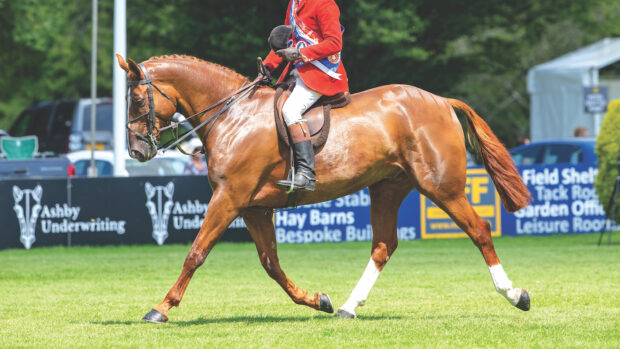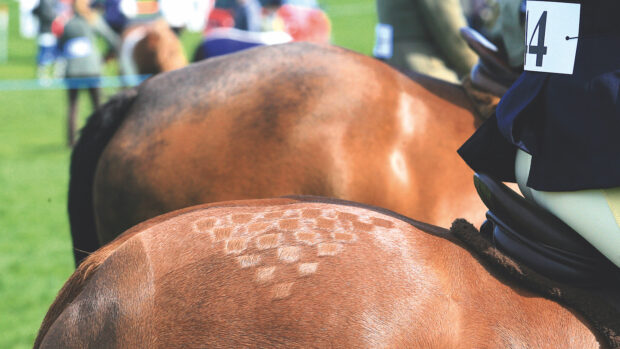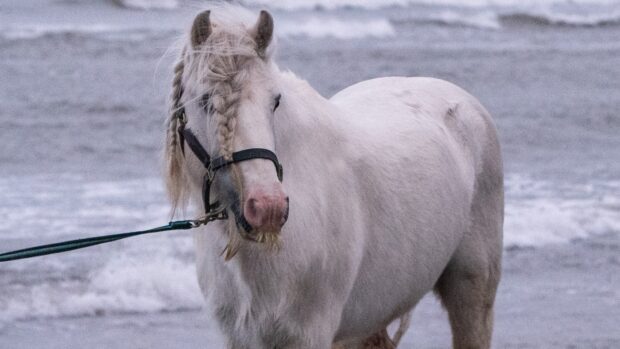In this exclusive, subscriber-only interview, Paris Olympics team bronze medallist Becky Moody looks back on her journey to the top to reflect on the highs, lows, and lessons learned along the way.
Becky Moody may have captured the hearts of fans at the Paris Olympics with a team bronze on her homebred 10-year-old, Jagerbomb – but her journey to that podium was anything but an overnight success.
Over her more than 25-year career, she’s competed three horses – Jagerbomb, Carinsio, and Famke PF – on the international grand prix stage, bringing several others to the highest level nationally. She’d represented her country on five youth teams and on senior Nations Cup teams all while amassing more than 30 national titles.
Yet until Paris, she’d never secured a spot on a senior championship team, and she admits she had nearly accepted that such a moment might not come for her.
“With the change from four riders to three on a team, and with the core riders we have in this country all having such an incredible string of horses I knew the possibility of breaking into that team was very, very unlikely,” she explains.

From the archives: one of Becky Moody‘s first appearances in Horse & Hound from June 1999.
“I guess I’d hoped maybe a Europeans or a worlds, where that extra team spot gives you a bit more leeway, but I don’t think I even thought that was going to happen until we realised how good Bomb was.
“You realise the more you do this, that you need to have a pretty special horse to be able to get to that level – and that’s what he is.
“There’s an element of luck involved, I have to be realistic about that. With Bomb, I’m lucky I bred what I did, I never set out to breed a superstar – I’m just lucky he’s turned into one.
“I’ve had some really talented horses in the past but for one reason or another, it just didn’t quite work out. But they’ve all made me the rider I am now.”
Significant interest in Jagerbomb
Jagerbomb is now among the most recognisable and beloved horses in international dressage and, understandably, there’s been significant interest in him ever since he was tapped as travelling reserve at last summer’s Europeans. But Becky has never entertained any of the significant financial offers.
“I’ve worked my arse off all my life to have a horse like this, I’m not going to stop here,” she says.

Becky Moody and Jaegerbomb pictured at home with the bronze medal they won at the 2024 Paris Olympics. Credit: Steve Dawe
And the pair have embraced the ambassadorial roles that have been thrust onto them with grace. At this summer’s national championships, Becky drew crowds, happily pausing for photos with and encouraging words with young fans.
“It’s taking me longer to get anywhere as loads of people want to say hello,” she laughed at the time. “But it’s so cool to feel the love and I’m hoping we can inspire the generation of tomorrow.”
Through it all – and amid the intense scrutiny surrounding dressage at the Olympics – Becky’s remained calm and approachable, refusing to get to swept up in the emotions of the moment.
“So many people have said to me, you must be on cloud nine after the Olympics, and I’m like, ‘Well, no, not really,’ because one of my philosophies is actually to try and stay pretty level-headed whatever happens. That means I don’t get so high when it’s great, but I also can protect myself by not getting so low when it’s bad.”
Why mental resilience matters
This mental resilience is something she’s developed over the years with the help of her long-time coach, David Hunt.
“He’s helped me enormously to become a stronger person, and to believe in what I’m doing,” Becky adds. “But sometimes you just don’t, of course you don’t, and that’s one of the hardest parts of what we do, and people need to talk about mental health more.
“I’ve definitely had my share of ups and downs, both with my confidence and mentally. I had a lot of success at junior and young rider levels, we got a team bronze and I was the highest-placed British rider at the last couple of Europeans I did.
“The horse I was riding was a fantastic small tour horse, he won at the nationals, and we were put on the World Class scheme, but he ended up not being a grand prix horse.”
Reflecting on those challenges, Becky explains how each experience has shaped her training approach today.
“That was partly because I hadn’t trained him to be a grand prix horse from an early enough stage,” she says. “He also maybe wasn’t totally cut out for it. But that was really tough and definitely messed with my head because I’d put pressure on myself to be able to do as well at grand prix as I’d done at every other level and it’s a completely different ball game.”

From the archives: Becky Moody (right) pictured with her sister Hannah Moody (left) after a successful outing at South View Equestrian Centre from November 1999
Becky continues: “Not every wonderful small tour horse makes a good grand prix horse, it’s a whole different kind of knowledge and experience that you need to train them for that.
“I know that now and I try to help people understand that the first couple of horses they train to grand prix, you’re going to make so many mistakes doing it because you’ve got so much to learn.
“You still make mistakes when you’re training your umpteenth horse to grand prix, because every horse is different, and you have to keep learning new things every time you do it. I believe how you mentally approach that is massively important – I often say my role as a coach is 20% technical, 80% counsellor.”
The challenges of social media
She adds that while equestrianism has always been a tough sport to be involved in – in terms of harmonising the unique needs of elite equine and human athletes – it’s been exacerbated by social media.
“It’s one of the things that frustrates me the most about the sport at the moment,” she says. “I’m pretty useless on socials in some ways, but I do always try to be myself – for me, that’s really important.
“And currently, I’m having a really lovely time on social media, it’s been a really supportive, and positive place for me – but it hasn’t always been.
“I think that as professional riders it’s very hard for us to post anything other than perfection, and I find that really frustrating because I think if young people, or anyone else, looking at our social media thinks that we live in a place where everything is perfect and our horses are going in a flawless frame all the time, they then expect or think they should be able to that themselves, and that’s not always how it goes.

Becky Moody takes a bow after her grand prix freestyle on Jagerbomb at the 2024 Paris Olympics. Credit: Peter Nixon
“I would absolutely love to show a three or four-year-old on social media that is only just starting to be sat on and is still wobbly, where you can see the talent but maybe they go a little bit too round at times and lose their balance and rhythm, and then put up another video in six months showing how things are getting stronger.
“But I know the minute I put that video up, where the horse drops behind the vertical for three strides I’m the world’s worst rider, then you just end up not doing it because it’s just too hard – so, instead, you just put the really short clip on where they look really cool and in a perfect balance.
“I find that so frustrating because there’s so much value in showing the process. I wish we could share it without fear.”
Becky Moody: “Our sport is in trouble”
Despite these frustrations, Becky believes that dressage must engage with its critics to retain its social licence to operate.
“Our sport is in trouble, I don’t think there’s any denying that,” she says. “I can’t pretend that I know exactly how to get it out of trouble, but I do think we have to look at how we can become more transparent and open.
“There’s a group of people that think horses just shouldn’t be ridden, and we need to be able to show them how much they love it, and how much they thrive off of it. A lot of these horses aren’t bred to be field ornaments, they’re bred to do a job, and we have to try and find a way to get that across in a positive way.
“It’s really hard, we’ve got to not try to talk at people. I think it’s too easy to get defensive, and we need not to be. We need to try and understand what to do and how to bring them around.
“We have to talk to people outside our bubble if we want to keep our sport in the Olympics.”
You may also be interested in:

*Exclusive* ‘Spectacular movement isn’t always good movement’: Becky Moody on young horses and her key training mantras

*Exclusive* ‘I literally couldn’t walk or halt!’: Becky Moody relives her medal-winning tests at the Paris Olympics

*Exclusive* The double bridle debate – the facts, the opinions… and the politics

Read +120 years of Horse & Hound in new online magazine archive




